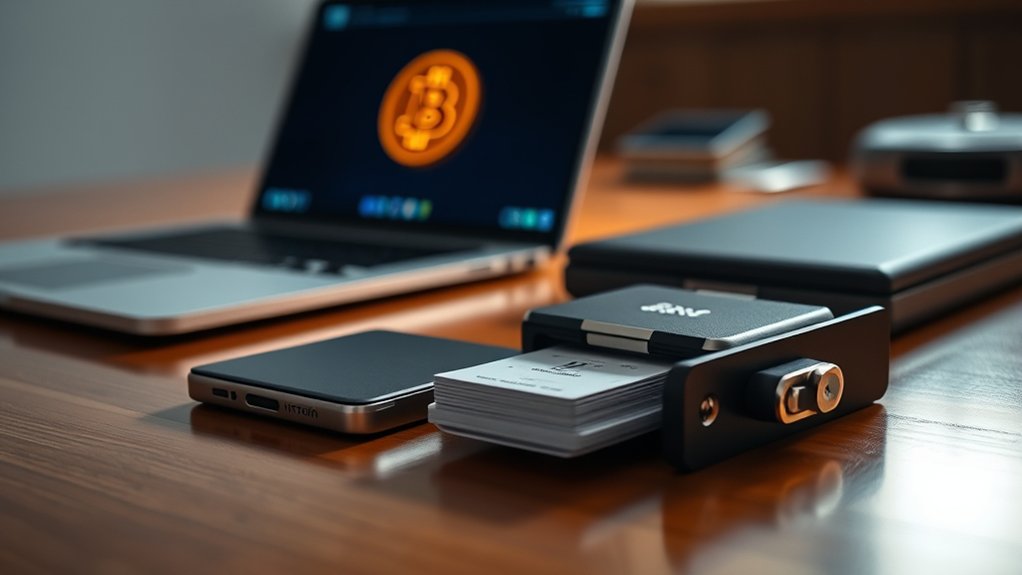Storing Bitcoin safely isn’t rocket science, but it’s essential. First off, cold storage is your friend. Think hardware wallets like Ledger or Trezor—offline and less hackable. Hot wallets? They’re like leaving your front door wide open. Sure, they’re convenient for quick cash, but don’t store all your Bitcoin there. Custodial wallets? Trust them at your own risk. And don’t forget about those pesky seed phrases; lose them, and you’re locked out. Want to know more? Keep going.

Storing Bitcoin safely? It’s a question that every newbie should ponder before diving headfirst into the crypto ocean.
First, there’s cold storage. Think of it as the Fort Knox of Bitcoin. These wallets aren’t connected to the internet, which means hackers can’t reach your precious coins. Ideal for long-term storage, cold wallets let you stash the bulk of your Bitcoin while you keep just a sprinkle in hot wallets for daily transactions. Hardware wallets like Ledger Nano X or Trezor Model T? They’re the go-to tools for this. But hey, don’t forget to lock them up in a fireproof safe. Because, you know, safeguarding private keys is crucial for enhancing your security. Utilizing cold wallets can significantly reduce the risk of online theft. Additionally, using a non-custodial wallet allows you to maintain complete control over your private keys, enhancing your security even further.
Now, let’s talk hot wallets. These are the flashy, internet-connected options. They’re great for quick buys and everyday spending. Mobile apps and web wallets make it easy to spend Bitcoin like you’re swiping a credit card.
Hot wallets are your go-to for quick transactions, but beware—they’re vulnerable to hacks like an unlocked front door.
But here’s the kicker: they’re like leaving your front door wide open at night. Highly susceptible to hacks and cyber threats, hot wallets should only hold a tiny amount of Bitcoin—like keeping just enough cash for a night out.
Custodial wallets? They’re managed by third parties, like exchanges. Super convenient, but you’re handing over your private keys to someone else. It’s like trusting a stranger with your life savings. Sure, some exchanges offer insurance, but they’re prime targets for attacks.
Then there are non-custodial wallets, where you hold your own keys. A bit more responsibility, but a lot more control. Just remember: if you lose that key, it’s game over.
Paper wallets? Well, they’re basically a physical piece of paper with your private keys. They could be lost, stolen, or deteriorate over time. Not the smartest option.
In this wild west of Bitcoin, securing seed phrases is essential. Store them in multiple secure locations and use a passphrase. Because, let’s face it, losing access to your Bitcoin is like throwing money into a black hole.
Frequently Asked Questions
Can I Store Bitcoin on an Exchange?
Sure, you can store Bitcoin on an exchange.
But, let’s be real—it’s like leaving your cash in a sketchy diner. Exchanges are convenient, no doubt. They let you trade easily.
But they’re also hacker magnets, with billions lost to breaches. Plus, you don’t control your private keys.
So, if the exchange goes belly up or gets hacked, say goodbye to your Bitcoin.
Stick to your wits, folks. Choose wisely!
What Happens if I Lose My Recovery Phrase?
Losing a recovery phrase? Tough luck. That’s a one-way ticket to being locked out of your own funds—forever.
Forget about customer service; there’s no help here. You could try some risky recovery methods, but that might just invite hackers to the party.
The financial hit? Ouch. And don’t even get started on the stress.
It’s a nightmare scenario for anyone who thought crypto was a get-rich-quick scheme. Spoiler alert: it’s not.
How Can I Recover Lost Bitcoin?
Recovering lost Bitcoin? Good luck with that.
First, check for your seed phrase—if it’s gone, you’re in trouble.
Professional recovery services? They charge a fortune and might not even help.
Data recovery tools can save deleted wallet files, but they’re hit or miss.
Use blockchain explorers to track transactions, but it’s like finding a needle in a haystack.
In short, if it’s lost, it’s likely lost for good.
Better luck next time!
Is Bitcoin Storage Taxable?
Is Bitcoin storage taxable? Nope, just stashing it away doesn’t trigger taxes.
But wait—if you sell, exchange, or even buy a coffee with it? Cha-ching! Capital gains tax hits you like a ton of bricks.
And if you earn Bitcoin through mining? Surprise! That’s taxable income right there.
Can I Store Bitcoin in a Bank Account?
Storing Bitcoin in a bank account? Not happening.
That’s like trying to fit a square peg in a round hole. Bitcoin needs a crypto wallet, not a vault at a bank.
Why? Because banks deal with cash, not digital coins. They can’t lend what they don’t have, and Bitcoin isn’t their game.





